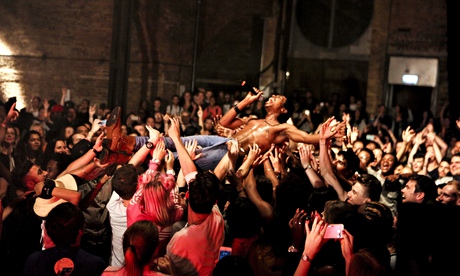
Standing in front of a stadium-size drumkit, backlit by blinding strobes, is a skinny Georgia teenager wearing a broad-brimmed hat. His chest is bare, but a diaphanous white shirt billows around his torso as he busts nimble moves with the mic stand. This is Raury, “just 19 year old,” he declares, from Atlanta, a showman beyond his years. We’re in a smallish train shed of a venue, but he’s playing it like it’s the O2 Arena.
As the set’s introductory cut, War Pt 1, thunders into focus with a whispered chant, then segues into a thumping Chariots of Fire, the impression is of a young southern version of Michael Jackson (actually, let’s dial that back to Bruno Mars) fronting a heavy rock band. Two busy, head-banging band members alternate between guitars and keyboards, one of them favouring a huge white keytar. From time to time, as on Cigarette Song, one of them plays sweet soul music on the keyboard’s tinkliest setting. On Devil’s Whisper, both wallop drum pads, adding to the din coming off the monster kit.
Even in an era where antique notions of genre are breaking down irreparably, the highly tipped Raury feels even more non-standard than usual. This fledgling operator is probably best known as a rapper. He first came to renown in the UK as the versifyer on SBTRKT’s churchy rave track Higher – delivered dizzyingly tonight. As though to back up the notion, up-and-coming UK MC Little Simz is a guest, letting loose flurries of rhymes as Raury dances around her, all smiles. Tonight’s support act is another UK hip-hop MC, Jay Prince.
But actually, Raury spent most of his time singing and playing guitar on his EP and mixtape of last year, Indigo Child Project – a calling card that has landed him a major-label deal, admirers in high places (Kanye West summoned him to a breakfast meeting; Lorde got him on to the latest Hunger Games soundtrack) and a spot on the BBC’s Sound of 2015 list.
When Raury picks up an acoustic guitar, all that’s missing is a piece of straw in his mouth and he’s a rural troubadour riding on a wagon, keeping alive the hippyish spirit of fellow Atlantans Arrested Development. Superfly finds Raury crooning sweetly on a track so breezy you can’t fathom why it’s not already on a mobile phone ad campaign.
In the shuffle on offer tonight, Raury’s best iteration, however, is easily a kind of 21st-century gospel-urban, the kind of thing Kanye inaugurated on Jesus Walks. Quoting Kanye’s line “we at war with ourselves”, Devil’s Whisper is a salutary tale of semi-autobiographical temptation, all clap-along beat and nagging chorus. While being seriously indebted, Devil’s Whisper still sounds startlingly good, and you wish more of Raury’s one-hour set was like this: hard-hitting, not pointlessly beefy. The song’s “oh, na-na” hook comes back later in the encore, on its companion piece God’s Whisper, which is perhaps even more emphatic. “I am the saviour,” it goes, “we are indigos.”
Perhaps most promisingly for the future – an album is due in the autumn – there is a lot to get stuck into with Raury, if he can streamline his many strings into a cogent weapon. He calls himself an Indigo Child, a label that seems to have lost its more “woo-woo” New Age origin, and now means a kind of super-conscious millennial, a generation that has grown up with the internet and refuses to recognise boundaries. The artwork for the EP found Raury depicted like an east African Christian icon, gazing up at an indigo sky. “Times are too serious to be making music about nothing,” he confides at one point, before calling for a moment’s silence for “all people unlawfully murdered across the world, not just in America”. You can hear a pin drop.
On the direct folk song Fly, he sings about having a target on his back, a feeling echoed in some of the most powerful records of the last year, not least Kendrick Lamar’s To Pimp a Butterfly and D’Angelo’s Black Messiah, in which black artists have reacted to the epidemic of police killings of unarmed African Americans. At the end of Fly, Raury stage-dives, an elegant arc into a crowd of waiting arms; it’s a bit literal, but the gesture works.

